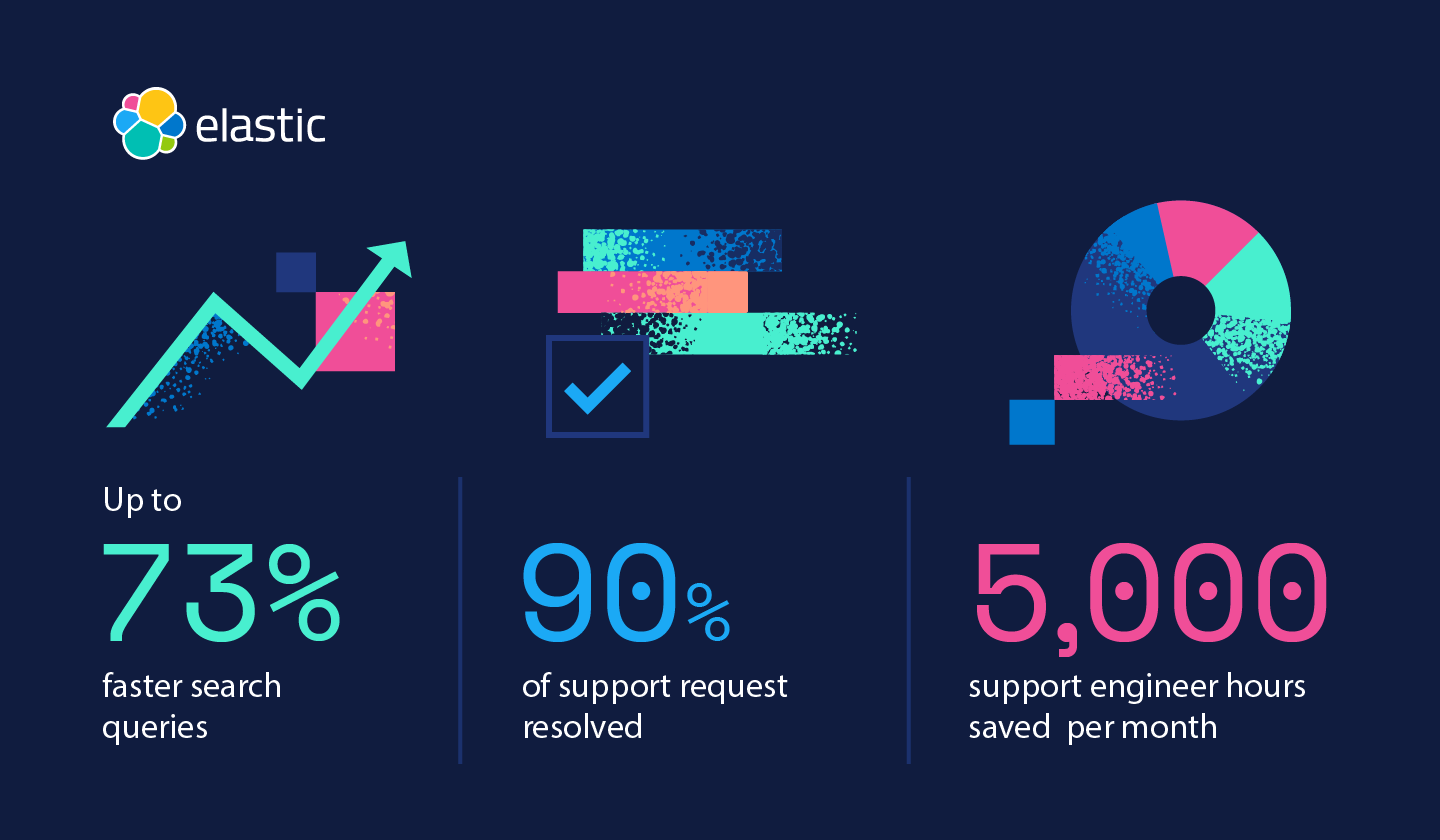Cisco uses Elastic to save 5,000 support engineer hours a month
.jpg)
With the precision of search and the intelligence of AI, Cisco uses Elastic on Google Cloud to create richer search experiences, so support engineers can quickly find the answers they need. Scaling from this success, Cisco's Search team added AI models, semantic search, and vector search to more than 50 internal- and external-facing apps, helping them innovate more quickly and increase overall operational efficiency.

The challenge
With more than two million service requests received each year, Cisco needed a solution that would help its 11,000 support engineers find answers by searching through its library of 50 million documents. Content search plays a key role in many areas of Cisco’s operations and is an essential feature on Cisco.com. With the need to provide employees, customers, and potential customers instant search to access the information they need, Cisco needed to ensure search experiences were accurate, efficient, and timely.
Today, people expect instant search access to the information they need. Keeping customers and potential customers aligned with relevant content about our solutions and services is fundamental to these relationships.
Sujith Joseph, Principal Enterprise Search and Cloud Architect at Cisco
The transformation
Using Elastic on Google Cloud, Cisco enables its support engineers to quickly retrieve documentation applicable to the customer service request. This means that when support engineers are on a call, they can find similar cases in real time using error messages related to the customer’s problem. From that, they will get relevant information from similar support cases, bug reports, knowledge articles, and internal discussion forums. This new search experience is able to solve 90% of service requests, freeing up support engineers' time to focus on more complex issues.
The Cisco.com search experience also went through a transformation. Using the same platform as the support engineer use case and Elastic's Search AI built on Google Cloud services, Cisco.com uses AI (neural question generation) to power autosuggestions. This solution has the capability for hybrid (semantic and textual) search on text passages.
Among other benefits, Cisco saw an improvement in:
User engagement: As a result of the new search capabilities, user engagement via click-through rates has gone up drastically, and the response time for a search query is now 73% faster, reducing the likelihood that people will lose interest while the page loads.
Speed of innovation: Cisco has been able to innovate more quickly due to Elastic’s integration with the latest cloud technologies and platforms.
Scalability: Elastic’s platform enables Cisco to continuously innovate by adding Search AI features, rolling out to more than 50 internal and external applications, with future potential for AIOps integration.
The solution
With Elastic’s feature-rich and flexible solutions, Cisco was able to reimagine its search experiences. Support engineers are able to take advantage of Elastic’s advanced Search AI capabilities to answer complex questions in real time. With Elastic’s Search AI, Cisco support engineers get the relevance of Cisco content and documents combined with the accuracy that Elastic is known for. Cisco.com users benefit from Elastic’s ability to preprocess search queries and return the relevant text from a document as part of the search results. This ensures users not only find the information they need but also the source it comes from.
When you combine the accuracy and speed of Elastic and the power of Google Cloud, you can build a very stable and cost-efficient search platform that also delivers a delightful experience for the user.
Sujith Joseph, Principal Enterprise Search and Cloud Architect, Cisco Systems
Why Cisco chose Elastic
Elastic’s Search AI Platform makes data searchable and usable for artificial intelligence. With so much data and so many documents to analyze, Cisco needed a solution that could find the most relevant data and bring it to the forefront while learning as it went.
The resilience and scalability of Elasticsearch ensure a strong foundation with room to add more capabilities and use cases in the future. Cisco looks forward to opportunities to further streamline integration and AIOps.
Elastic offers a 100% cloud-native solution that includes integration with Google Kubernetes Engine. This simplifies management and deployment while optimizing cost efficiency.
Contact us to learn how Elastic can help you save time and budget with Search AI.
The release and timing of any features or functionality described in this post remain at Elastic's sole discretion. Any features or functionality not currently available may not be delivered on time or at all.
In this blog post, we may have used or referred to third party generative AI tools, which are owned and operated by their respective owners. Elastic does not have any control over the third party tools and we have no responsibility or liability for their content, operation or use, nor for any loss or damage that may arise from your use of such tools. Please exercise caution when using AI tools with personal, sensitive or confidential information. Any data you submit may be used for AI training or other purposes. There is no guarantee that information you provide will be kept secure or confidential. You should familiarize yourself with the privacy practices and terms of use of any generative AI tools prior to use.
Elastic, Elasticsearch, ESRE, Elasticsearch Relevance Engine and associated marks are trademarks, logos or registered trademarks of Elasticsearch N.V. in the United States and other countries. All other company and product names are trademarks, logos or registered trademarks of their respective owners.

